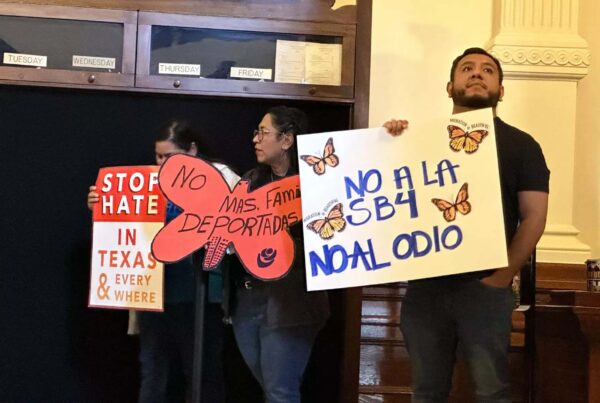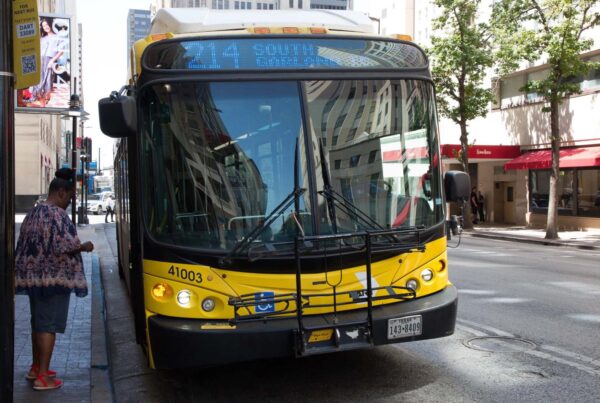This movie may seem familiar.
The federal government was set to partially shut down if Congress couldn’t make a deal to keep it funded and it looked like the House of Representatives, under the new leadership of Republican Speaker Mike Johnson, might not make a deal by the Friday deadline.
Republicans on the far right, of which Johnson is one, oppose the bill because of, in their view, its failure to adequately cut spending and secure the southern border. A coalition of Democrats and moderate Republicans carried the bill. However, now the U.S. Senate will consider the same stopgap spending measure.
If the Senate does pass the bill and it’s signed by President Biden, it only delays the debate until mid-January.
What role does the Texas congressional delegation play in all this? Joseph Morton, reporter in the Washington, D.C. bureau of the Dallas Morning News, joined Texas Standard to break it all down. Listen to the story above or read the transcript below.
This transcript has been edited lightly for clarity:
Texas Standard: First, before we get into how Texans voted, can you just explain real quick what precisely this bill does that the House passed yesterday?
Joseph Morton: So Congress has to adopt these annual spending bills every year, typically by the end of Sept. 30, in order to keep the government funded – keep it open. And they passed a stopgap measure at the end of September, what they call a “clean continuing resolution” that doesn’t have any additional policy provisions in it. It just says “we’re hitting the snooze button and keeping everything exactly the same.”
When Kevin McCarthy allowed that to happen, some far right members got very upset and ousted him, which is why we have a new speaker, Mike Johnson. That temporary measure just runs until Friday. So we’re back up against the deadline.
Mike Johnson yesterday put essentially another clean stopgap measure on the floor, although he has a new innovation, as he says, which staggers it to two different dates and says this will change the dynamic by pushing it off to January and avoiding what typically they do most years, which is they wait until the very last minute right before Christmas, roll all the bills together, drop it on members and say “look, either either vote for this or you’re handing your constituents a shutdown right before Christmas.” So that passed the House last night to punt this to January.
The Senate still has to approve it, but we expect that will happen. And then President Joe Biden will have to sign it again. We expect him to sign it.
We have seen similar situations under other speakers – Kevin McCarthy, Nancy Pelosi, John Boehner. Did you notice anything different about how Speaker Johnson managed this?
So, I mean, it’s remarkably similar to previous moves that the speaker’s have made in the past where they get right up to the deadline and then they just say “okay, we’re just punting. We’re giving up on our policy requests and basically we’re going to live to fight another day.” Again, it cost McCarthy his job.
In the case of Johnson, it definitely angered a number of far right conservatives. Chip Roy from Austin is one of those who was very steamed by this and denounced the entire plan as sort of nothing new, just more of the same. Others, including some conservatives – Troy Nehls of Richmond, Texas – said, you know, “let’s give this guy a little leeway. He’s only been on the job for three weeks. He sort of just clocked in, so let’s give him a pass on this one.”
Johnson, I think, gets this one pass from his members. If he goes down the same path come January, we may be, you know, looking for a new speaker. We’ll see.
Once again. So you mentioned a couple Texas representatives there and how they voted. I understand that all the Texas Democrats supported this measure, but not all the Republicans. Can you give us a little bit more of a breakdown of which ones voted for the measure and which ones didn’t?
Sure. And I know you kind of you mentioned that there was a general schism of conservatives versus moderates, but it was really kind of all over the map.
Some of the members who voted against it, particularly in the Dallas-Fort Worth area, where Keith Self of McKinney, Beth Van Duyne of Irving. Roger Williams… I mean, there are 25 [Texas] Republicans in the House – 13 of them voted against it, 12 voted for it. And so, you know, they split almost as evenly as they could with an off number of Republicans.
You saw some of the members who are more aligned with leadership – like Congresswoman Kay Granger, who’s the appropriations chair – she was carrying the bill. She voted for it. Congressman Michael Burgess, who’s vice chair of the rules committee, he voted for it, but there was a little bit of ideological differences there.
As I mentioned, a couple of members from Texas who would you consider more on the moderate side voted against it. And you had Troy Nehls, who’s a sort of hard right member saying, you know, “I like Johnson, I want to give him a pass on this” and voted for it even though he’s opposed these kind of stopgap measures in the past, even very conservative versions.















